Unit 3
unit3-课文精讲

His famous stories
The Adventures of Tom Sawyer; The Adventures of Huckleberry Finn.
Mark Twain: (1835—1910)
The greatest humorist of the 19th
century American literature.
Real name of MT Meaning of his pen name Birth date
Samuel Langhorne Clemens river
1835 (died 1910)
Birth place
Florida
Place where he grew up
In Hannibal, Missoouri, along the Mississippi River.
亨 利:是的,从旧金山来。
罗德里克:你对伦敦熟悉吗?
HENRY: That's right, from San Francisco.
亨 利:一点儿也不熟,这是我第一次
来伦敦。
RODERICK: How well do you know London?
HENRY: Not at all, it's my first trip here.
RODERICK: Young man, would you step inside a moment, please?
HENRY: Who? Me, sir?
RODERICK: Yes, you.
OLIVER: Through the front door on your left.
HENRY: (A servant opens a door) Thanks.
Unit3词汇及翻译

Unit 31.There are aways people who dream to make a(n) from gambling(赌博),even though they know the chances are slim(苗条的、微小的).总有一些人梦想着从赌博中发财,即使他们知道机会很渺茫。
young because he couldn’t work out easy mathematical(数学的) calculations(计算)在发明家托马斯·爱迪生小的时候,被视为是一个傻孩子,因为他连简单的数学运算都算不出来。
犯罪嫌疑人) for about two days before they finally caught him in a deserted warehouse(仓库).警察追赶抢劫嫌疑犯大约两天之后,他们终于在一个废弃的仓库里抓到了他。
运动、活动) to raise money for the girl who has caught a rare(rare) disease(疾病).地方报社开展了一个为患有稀有疾病的女孩捐款活动。
5.Rock climbing is attractive(有吸引力的) especially to young peoplebecause it is always with hardship(困难) and adventure.攀岩是具有吸引力的,尤其是对年轻人来说,因为它总是伴随着困难和冒险。
6.The face value(面值) of the bill(账单、钞票(内在的) value is nothing but that of a piece of paper.该票据面值为一美元,但其内在价值只是一张纸。
7.Having won several championships in international matches recently,hecurrently(目前among the world’s professional tennis players.在最近的国际比赛中赢得了几次冠军,他目前在世界上职业网球选手中排名第二。
人教版九年级英语全册教师用书:Unit 3
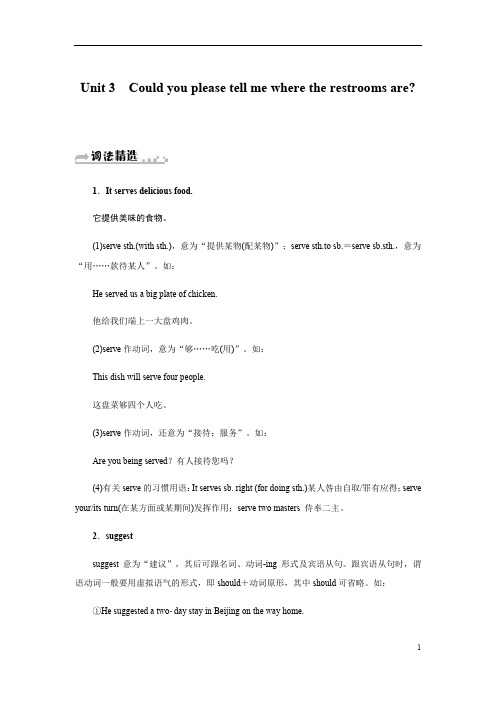
Unit 3Could you please tell me where the restrooms are?1.It serves delicious food.它提供美味的食物。
(1)serve sth.(with sth.),意为“提供某物(配某物)”;serve sth.to sb.=serve sb.sth.,意为“用……款待某人”。
如:He served us a big plate of chicken.他给我们端上一大盘鸡肉。
(2)serve作动词,意为“够……吃(用)”。
如:This dish will serve four people.这盘菜够四个人吃。
(3)serve作动词,还意为“接待;服务”。
如:Are you being served?有人接待您吗?(4)有关serve的习惯用语:It serves sb. right (for doing sth.)某人咎由自取/罪有应得;serve your/its turn(在某方面或某期间)发挥作用;serve two masters 侍奉二主。
2.suggestsuggest意为“建议”,其后可跟名词、动词-ing形式及宾语从句。
跟宾语从句时,谓语动词一般要用虚拟语气的形式,即should+动词原形,其中should可省略。
如:①He suggested a twoday stay in Beijing on the way home.他建议回家途中在北京停留两天。
②My father suggested sending for a doctor at once.我父亲建议马上派人请个医生。
③The teacher suggested that we (should) speak English as much as possible in class.老师建议我们尽可能在课堂上多讲英语。
3.depend on取决于depend on+名词/代词/宾语从句,意为“视……而定;取决于……”。
Unit 3 知识点详解

1.I’m going to exercise.我将要去锻炼。
exercise锻炼,动词;锻炼,名词exercise=take exercise=take some exercise锻炼2.Are you going to climb a hill?你将要去爬山吗?climb爬,及物动词climb a hill爬山3.You need to exercise and keep fit.你需要去锻炼和保持健康。
need需要,及物动词need to do sth需要去做某事need to exercise需要去锻炼keep保持,系动词fit健康的,形容词keep fit保持健康=keep healthy=stay healthy4.This hill isn’t as high as a real one!这座山没有真的山那么高!high高的,形容词as high as和...一样高(as...as中间加形容词的原形)not as high as不如,没有...高real真正的,形容词a real hill一座真正的山5.Let’s enjoy ourselves!让我们好好享受吧!let’s=let us让我们let让,及物动词let sb do sth让某人做某事Let us play together.让我们一起玩。
enjoy喜欢,享受,及物动词enjoy oneself好好享受,玩得开心enjoy yourself你自己玩得开心enjoy ourselves我们自己玩得开心6.Yesterday I took a boat trip under the famous Harbour Bridge and went past the Sydney Opera House.昨天我在著名的港湾大桥下乘船旅行,经过了悉尼歌剧院。
trip短途旅行,可数名词take a boat trip乘船旅行under在...的下面under the famous Harbour Bridge在港湾大桥下面go past经过=passthe Sydney Opera House悉尼歌剧院go past the Sydney Opera House=pass the Sydney Opera House经过悉尼歌剧院7.I’m having a great time in Australia!我在澳大利亚玩得很开心!have a great time=have a good time=have a nice time=have a wonderful time玩得很开心8.Take care!保重!care照顾,关怀,名词take care保重take care of...照顾...=look after...take good care of...照顾好=look after...welltake good care of yourself=look after yourself well照顾好你自己9.We’re sitting in a little coffee shop by the River Seine.我们正坐在塞纳河旁边的一个小咖啡馆里面。
人教版九年级英语Unit3单词、课文知识梳理,词汇句式精讲
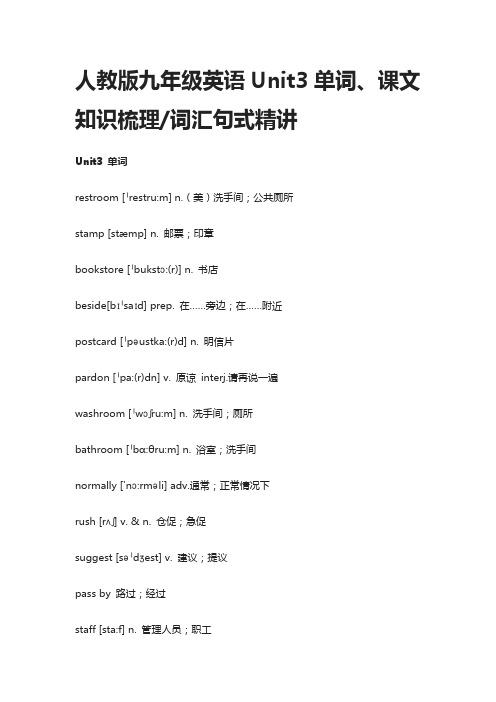
人教版九年级英语Unit3单词、课文知识梳理/词汇句式精讲Unit3 单词restroom [ˈrestru:m] n.(美)洗手间;公共厕所stamp [stæmp] n. 邮票;印章bookstore [ˈbukstɔ:(r)] n. 书店beside[bɪˈsaɪd] prep. 在……旁边;在……附近postcard [ˈpəustka:(r)d] n. 明信片pardon [ˈpa:(r)dn] v. 原谅interj.请再说一遍washroom [ˈwɔʃru:m] n. 洗手间;厕所bathroom [ˈbɑ:θru:m] n. 浴室;洗手间normally ['nɔ:rməli] adv.通常;正常情况下rush [rʌʃ] v. & n. 仓促;急促suggest [səˈdʒest] v. 建议;提议pass by 路过;经过staff [sta:f] n. 管理人员;职工grape [greip] n. 葡萄central [ˈsentrəl] adj. 中心的;中央的Nearby [ˌnɪrˈbaɪ] adj.附近的;邻近的adv.在附近;附近Pardon me 抱歉, 对不起;什么,请再说一遍mail [meil] v. 邮寄;发电子邮件n. 邮件east [i:st] adj. 东方的;东部的adv.向东;n.东方fascinating [ˈfæsineitiŋ] adj.迷人的;有吸引力的. Inexpensive[ˌɪnɪkˈspensɪv] adj.不昂贵的Uncrowded [ʌnˈkraʊdɪd] adj.不拥挤的;人少的convenient [kənˈvi:niənt] adj. 便利的;方便的mall [mɔ:l] n. 商场;购物中心clerk [kla:k][kl:rk] n. 职员corner [ˈkɔ:(r)nə(r)] n. 拐角;角落politely [pəˈlaitli] adv. 礼貌地;客气地request [riˈkwest] n. 要求;请求direction [diˈrekʃn] [daiˈrekʃn] n. 方向;方位correct [kəˈrekt] adj. 正确的;恰当的polite [pəˈlait] adj. 有礼貌的;客气的. direct [diˈrekt, daiˈrekt] adj. 直接的;直率的. speaker [ˈspi:kə] n.讲(某种语言)的人;发言者whom [hu:m] pron. 谁;什么人impolite [ˌɪmpəˈlaɪt] adj. 不礼貌的;粗鲁的address [əˈdres], [ˈædres] n.住址;地址;通讯处. Underground [ˈʌndəɡraʊnd] adj.地下的;n.地铁Parking lot n.停车场course [kɔ:(r)s] n. 课程;学科Italian [Iˈtæli ən] adj.意大利\人的;n.意大利人\语Tim [tim] 蒂姆(男名)Unit3 知识梳理【重点短语】1.a pair of 一对,一双,一副2.between A and B 在a和b之间3.on one’s / the way to 在去……的路上4.pardon me 什么,请再说一遍5.pass by 路过经过6.look forward to 盼望期待7.excuse me 打扰了请原谅8.get some information about 获取有关……的一些信息9.turn left\right 向左\向右转10.go past 经过路过11.a little earlier 早一点儿12.a good place to eat 一个吃饭的好地方13.in different situation 在不同的情况下14.on time 准时按时15.get to 到达16.have dinner 吃晚餐17.on one’s / \the right在右边e on 快点请过来19.the shopping center 购物中心20.the corner of....... 的角落/拐角处21.lead into 导入,引入【重点句型】1.问路常用的句子:①Do you know where is …?②Can you tell me how can I get to …?③Could you tell me how to get to …?④Could/Will/Would you please tell me sth.表示十分客气地询问事情Could you tell me how to get to the park?请你告诉我怎么才能去邮局好吗?2. decide to do 决定做…...She decided to go to have lunch. 她决定去吃午餐。
unit 3答案

Unit3 SportsLead-in Activities1.sword playing; chuiwan; wresting; cuju.2.3.Omitted.Text AText Comprehension1.Answer the following questions after you have read the whole text.(1)Because Chinese Martial Arts has a long history, widespread influence and prominent cultural, sports, historic significance.(2)In the later primitive societies the skills of kicking, boxing and blocking began to appear at ceremonial rituals where they were combined with dance to represent their heroes, thus forming the earliest series of Kung Fu moves and performances.(3)Kung Fu styles are often classified according to their common traits and geographical location, identified as “families” “sects” or “schools” of martial arts.They can also be categorized according to religion, imitative-styles and family styles, etc.(4)The former emphasizes muscular strength while the latter the “internal power”, which includes the manipulation of the inner breath and internal circulation.(5)Aside from its function in offence & defence, Kung Fu has a considerable role to play in moral cultivation, body building, and aesthetic appreciation.(6)The Chinese character “武”(martial art) comprises of two characters: “止” (stop) and “戈” (an ancient weapon), which indicates that the essence of martial art is not to fight, but to maintain peace.(7)Chinese Kung Fu was first introduced abroad to the United States by Chinese-American Kung Fu master Bruce Lee, whose agile movements in a series of his great movies swept American audiences off their feet.(8)No. To further delight audiences, movie makers add more and more modern techniques into their films exaggerating the effect of Kung Fu.Vocabulary Exercises1.Choose appropriate words to fill in the gaps below. Change the form if necessary.(1)enchant (2) Primitive (3) render (4) prominent (5) imitative (6) exaggerated (7) deficient (8) circulation (9) survival (10) embraces2.Translate the following sentences into English with the words given below. Note that you are encouraged to use the sentences in Text A.(1)Chinese Kung Fu is effective both in battle and in building physical strength. In addition, it unites with the traditional medicine concepts of human’s meridians and collaterals, Qi and blood.(2)During thousands of years (of development),Kung Fu has developed into a comprehensive system embracing numerous sects, schools and disciplines rare seen in the world.(3)All schools of Chinese Kung Fu masters hold it a top priority to cultivate moral characters, spirit and temperament, as well as develop good manners and conduct, through practicing martial arts.(4)Different with the aggressive and brutal western boxing based on the value of individualism, Chinese martial art is imbued with Chinese people’s unique perspective on fighting, profound culture and philosophy including Confucianism, Daoism and Buddhism, thus forming a comprehensive and unique system.(5)Coming up to date, Chinese Kung Fu has become something of a necessity in movies and soap operas.Text BText Comprehensionplete the following paragraph according to the above text.The United Kingdom is notable for the diversity of its sporting interest. Sports play an important role in promoting integration and in nurturing talents in the country. The country has given birth to several major international sports such as football, rugby, cricket, golf, tennis, and track and field among others. Sport is a major source of entertainment in the UK with thousands of spectators filling stadiums and arenas to cheer on their favorite teams. Sports are also major sources of revenue in the UK for players, government, and investors.Cricket was first embedded in the UK before spreading to the rest of the Commonwealth C. The comparative slowness and quietness reflects British gentlemanly sportsmanship. Also, cricket is often believed to be associated with a set of English sportsmanship values such as “fair play”, “team spirit”and individual excellence. If any action in other spheres of life, whether in business, politics or everyday interaction does not meet these standards, particularly of honesty and fairness, it is described as “not cricket”.2.Read the text and Mark T for true statements, and F for false statements below.1.F2. T3. F4. T5. F6. T7. T8. T9.T 10. FTheme-related Exercises1.Read the following passage and fill in the gaps with words given in the box.Cricket fighting (斗蟋蟀)is a kind of sport involving the fighting of male crickets in China. Unlike most blood sports such as bullfighting and cockfighting, cricket fighting rarely causes injuries to the animals. To play the game, two crickets are matched up according to size, weight, and color. Both combatants are placed in a small fighting arena, with walls high and thick enough to prevent desertion. The cricket trainers stimulate their charges with a straw or a fine-haired brush, and then the insect warriors go at each other, antennae waving and jaws snapping.Cricket Culture in China encompasses a history of 2000 years. The two millennium of tradition may be divided into three eras. From times prior to the Tang dynasty (500 B.C. - 618 A.D.), people only appreciated the cricket’s powerful tunes. During the Tang dynasty (618 - 907A.D.), the imperial concubines used small gold cages to accommodate crickets and took them to bed to hear their singing during the night. In the Song dynasty (960 - 1279 A.D.), cricket fighting flourished as a popular sport. Such an activity was still flourishing during the Qing Dynasty (1616-1911), when the Emperor’s family, city residents or village men and scholars, all collected crickets feverishly every summer. The tradition has ancient roots and has been handed down throughout the generations to the present day.For centuries, China has regarded a cricket chirping around the house as an auspicious symbol, a deluge of cricket means wealth will come to the family. Now, cricket fighting is mainly found in the large cities of Shanghai, Beijing, Tianjin, Guangzhou, and Hong Kong. There are cricket fighting clubs and societies that cater to member’s interest at all levels of intensity. With the migration of Chinese to otherparts of the world, cricket fighting can be found in New York and Philadelphia.2.Translate the following paragraph into English with the words in the brackets.Traditional sports with distinct Chinese characteristics are very popular, including martial arts, taijiquan, qigong, Chinese chess and Go (or encirclement chess). Martial arts, combining exercise and self-defense, enjoy great popularity in China. Martial arts include bare-handed boxing as well as offence and defense with equipment, both of which has different schools. Taijiquan, or Chinese shadow boxing, is one of the internal styles of Chinese martial arts. It combines control of body, mind and breath. Qigong, a system of deep breathing exercises, is a unique Chinese way of keeping fit. It aims at enhancing health, promoting longevity, curing illnesses and improving physiological functions by concentrating the mind and regulating the breath.。
人教版九年级英语Unit3重点知识归纳
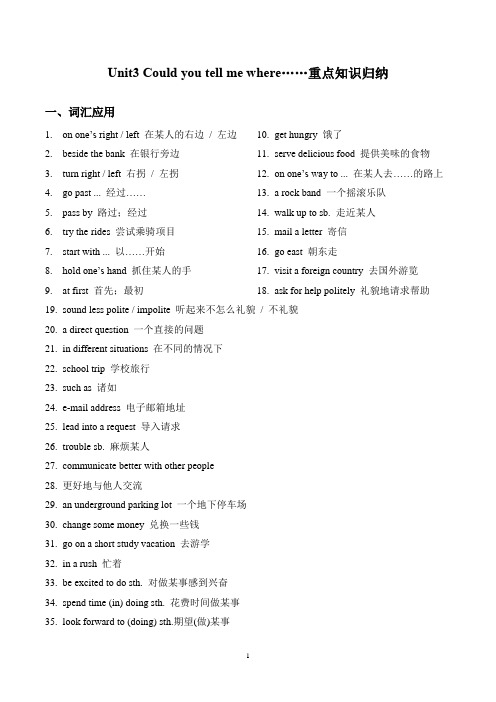
Unit3 Could you tell me where……重点知识归纳一、词汇应用1.on one’s right / left在某人的右边/ 左边2.beside the bank 在银行旁边3.turn right / left 右拐/ 左拐4.go past ... 经过……5.pass by 路过;经过6.try the rides 尝试乘骑项目7.start with ... 以……开始8.hold one’s hand 抓住某人的手9.at first 首先;最初10.get hungry 饿了11.serve delicious food 提供美味的食物12.on one’s way to ... 在某人去……的路上13.a rock band 一个摇滚乐队14.walk up to sb. 走近某人15.mail a letter 寄信16.go east 朝东走17.visit a foreign country 去国外游览18.ask for help politely 礼貌地请求帮助19.sound less polite / impolite 听起来不怎么礼貌/ 不礼貌20.a direct question 一个直接的问题21.in different situations 在不同的情况下22.school trip 学校旅行23.such as 诸如24.e-mail address 电子邮箱地址25.lead into a request 导入请求26.trouble sb. 麻烦某人municate better with other people28.更好地与他人交流29.an underground parking lot 一个地下停车场30.change some money 兑换一些钱31.go on a short study vacation 去游学32.in a rush 忙着33.be excited to do sth. 对做某事感到兴奋34.spend time (in) doing sth. 花费时间做某事35.look forward to (doing) sth.期望(做)某事e on 加油;快点儿37.pardon me 抱歉,对不起;什么,请再说一遍二、重点句型1.问路常用的句子:①Do you know where is … ?①Can you tell me how can I get to …?①Could you tell me how to get to …?①Could/Will/Would you please tell me sth.表示十分客气地询问事情Could you tell me how to get to the park?请你告诉我怎么才能去邮局好吗?2. decide to do 决定做…...She decided to go to have lunch. 她决定去吃午餐。
Unit 3 参考译文及答案
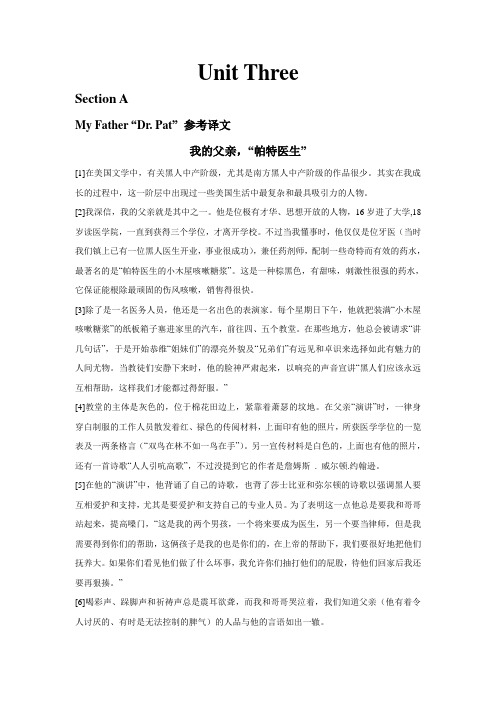
Unit ThreeSection AMy Father “Dr. Pat”参考译文我的父亲,“帕特医生”[1]在美国文学中,有关黑人中产阶级,尤其是南方黑人中产阶级的作品很少。
其实在我成长的过程中,这一阶层中出现过一些美国生活中最复杂和最具吸引力的人物。
[2]我深信,我的父亲就是其中之一。
他是位极有才华、思想开放的人物,16岁进了大学,18岁读医学院,一直到获得三个学位,才离开学校。
不过当我懂事时,他仅仅是位牙医(当时我们镇上已有一位黑人医生开业,事业很成功),兼任药剂师,配制一些奇特而有效的药水,最著名的是“帕特医生的小木屋咳嗽糖浆”。
这是一种棕黑色,有甜味,刺激性很强的药水,它保证能根除最顽固的伤风咳嗽,销售得很快。
[3]除了是一名医务人员,他还是一名出色的表演家。
每个星期日下午,他就把装满“小木屋咳嗽糖浆”的纸板箱子塞进家里的汽车,前往四、五个教堂。
在那些地方,他总会被请求“讲几句话”,于是开始恭维“姐妹们”的漂亮外貌及“兄弟们”有远见和卓识来选择如此有魅力的人间尤物。
当教徒们安静下来时,他的脸神严肃起来,以响亮的声音宣讲“黑人们应该永远互相帮助,这样我们才能都过得舒服。
”[4]教堂的主体是灰色的,位于棉花田边上,紧靠着萧瑟的坟地。
在父亲“演讲”时,一律身穿白制服的工作人员散发着红、禄色的传阅材料,上面印有他的照片,所获医学学位的一览表及一两条格言(“双鸟在林不如一鸟在手”)。
另一宣传材料是白色的,上面也有他的照片,还有一首诗歌“人人引吭高歌”,不过没提到它的作者是詹姆斯. 威尔顿.约翰逊。
[5]在他的“演讲”中,他背诵了自己的诗歌,也背了莎士比亚和弥尔顿的诗歌以强调黑人要互相爱护和支持,尤其是要爱护和支持自己的专业人员。
为了表明这一点他总是要我和哥哥站起来,提高嗓门,“这是我的两个男孩,一个将来要成为医生,另一个要当律师,但是我需要得到你们的帮助,这俩孩子是我的也是你们的,在上帝的帮助下,我们要很好地把他们抚养大。
unit 3 课文知识细解码

19
[例 2] It was several hours before the traffic could get on the move.
过了好几个小时交通才恢复通畅。 [翻译] 有人说文明总是在进步。 It is said that civilization is always on the move.
返 首 页
10
知识要点3 ban vt.明令禁止;取缔 n.禁令
(教材 P26)…and all new development is banned within
park boundaries. ……在公园范围内所有新的开发项目都被禁止。
[例1] Britain's health experts are pushing for a ban on all cigarette advertising.
返 首 页
6
知识要点2.(使)徐徐移
动;给……加边 (教材 P26)I leave my tent and walk over to the mountain edge. 我离开帐篷,走到山边。 [例 1] The climbers edged along the cliff. 攀登者沿着悬崖边侧身移动。
of life.
他去法国后, 很快就接受了法国的生活方式。
返
首
页
28
[例 2] In no way am I going to adopt any of his methods. 我绝对不会采纳他的任何方法。 [翻译] 我们一致同意采取新的教学方法。
We all agree in adopting the new teaching method.
We cut the trees down to make the lake visible from the house.
高中英语必修三Unit3单词

高中英语必修三Unit3单词1. diverse adj.不同的:多种多样的diversity n.差异(性);不同(点);多祥性2. fortune n.机会:运气气fortune cookie幸运曲奇3.gumbo n.秋葵汤(用秋葵荚做的浓鸡汤或海鲜汤)4.nachos n. [pl.] 墨西哥玉片5. chip (英)炸土豆条:(美)炸薯片:芯片:碎片6.cheese n.干酪;奶酪7.spicy adj加有香料的:辛辣的8.ethnic adj.具有民族特色的:异国风味的:民族的:种族的9.admit vi.&vt 承认vt.准许进入(或加入)10.definitely adv.肯定;确实11.occur vi. 发生:出现12.downtown adv.在市中心:往市中心13.mission n.传教(区);重要任务;使命14.districtn.地区;区域15.graffiti n. [pl]涂鸦;胡写乱画ic n.连环画杂志;漫画杂志;喜剧演员adj.滑稽的;使人发笑的17.afterwards(NAmE usually afterward) adv. 以后;后来18.head to .朝....前进;向.....去19.historical adj. (有关)历史的20.seek vt.& vi. (sought /s:t/,sought)寻找;寻求;争取: (向人)请求seek one's fortune寻找成功致富之路;闯世界21.earn/3an/v.&vi.挣得;賺得;赢得;博得earn a living谋生22.immigrant n. (外来)移民:外侨23. select vt. 选择;挑选;选拔24. china n.瓷;瓷器25. jazz n.爵士乐26.bar n.酒吧;小吃店;小馆子27.diagram n.简图;图解;图表:28. journal n.日志;日记;报纸;刊物29. claim v.&.n.夺取(生命);宣称;断言30. series n.系列;连续;接连series of系列或一连串(事件)31.apart from ( especially NAmE aside from )除了....外(还) ;此外32.minority n.少数民族;少数派;少数人33. escape vi.& vt. 逃走;逃脱;避开n.逃跑;逃脱;解脱34. bring about导致;引起35.Atlantic adj.大西洋的36.financial adj.财政的;财务的;金融的37. poetry n.诗集;诗歌;诗作38. jeans n.牛仔裤39. boot n.靴子40. mushroom n.蘑菇;蕈41. poisonous adj.引起中毒的;有毒的;分泌毒素的poison n.毒物;毒药;毒素 vt.毒死;毒害42. fold vt.包;裹;折叠vt.&vi.(可)折小;(可)叠平43. super adv.特别;格外 adj.顶好的;超级的44. collection n.作品集;收集物;收藏品44. accessory n.配饰;附件;配件45. souvenir n.纪念物;纪念品46. percentage n.百分率;百分比47. climate n.气候48. mild adj.温和的;和善的;轻微的49.settle vt.& vi.定居;结束(争论);解决(纠纷)49. construction n.建筑;建造;建造物; (句子、短语等的)结构50. material n.材料;布料;素材 adj.物质的;实际的51. to name but a few仅举几例52. tai chi (also t'ai chi)n.太极拳52. clothing n.衣服;服装54. herbal adj.药草的;香草的55. suit vt. 适合;满....需要;相配;合身n.西服;套装56. [at) first hand第一手;亲自57. item n.项目; -件商品(或物品);一条(新闻)58. contain vt.包含;含有;容纳59. contain vt.包含;含有;容纳图60. neat adj.极好的;整洁的;整齐的61. San Francisco 圣弗朗西斯科(旧金山) ( 美国城市)62. Napa Valley 纳帕谷(美国)62. the Golden Gate Bridge金门桥63. the Mission District教会区(旧金山)人64. Mexico 墨西哥(北美洲国家)65.California 加利福尼亚( 美国州名)65. Cantonese adj.广东的;粤语的n.粤语;广东人66. the Richmond District里士满区(旧金山)67. Huangguoshu Waterfall 黄果树瀑布68Journey to the West《西游记》69. Tin How Temple天后古庙70. Bank of Canton 广东银行71. Potsmouth Square花园角广场(旧金山)72. Robert Louis Stevenson罗伯特●路易斯.斯蒂文森 (英国作家)。
unit3单词

thank /θæŋk/ interj.&v. 感谢;谢谢 for /fɔ:(r)/ prep. 为了;给;对
thank you for… 为……而感谢
help /help/v.&n. 帮助;援助 welcome /′welkəm/ adj. 受欢迎的 You’re welcome 别客气
baseball 棒球 watch 表,手表 computer 计算机,电脑 game 游戏,运动,比赛 card 卡片 ID card 学生卡,身份证 notebook 笔记本 ring 戒指 bag 袋,包
Anna 安娜(女名) John 约翰(男名) David 戴维(男名)
pencil /′pensl/ n. 铅笔 book /buk/ n. 书 eraser /I′reizə(r)/ n. 橡皮 box /bɒks/ n. 箱;盒 pencil box 铅笔盒;文具盒 schoolbag /′sku:lbæg/ n. 书包 dictionary /′dIk∫ənrI/ n. 词典;字典 his /hIz/ pron. 他的 hers /hЗ: (r)z/ pron. 她的 mine /main/ pron. 我的
in 在……里 library 图书馆 ask 请求,要求,询问 ask…for… 请求,恳求(给予) find 找到,发现 some 一些 classroom 教室 e-mail 电子邮件 at 按照,根据,在(某处,某时间或时刻) call ( 给……)打电话 lost 遗失,丢失
must 必须 set 一套,一副,一组 a seห้องสมุดไป่ตู้ of 一套,一副,一组
excuse /Ik′skju:z/v. 原谅;宽恕 me /mi:/ pron. 我 excuse me 劳驾,请原谅 teacher /′ti:t∫ə/ n. 老师;教师 about /ə′baut/ prep. 关于 What about…?(询问消息或提出建议) ……怎么一样?……好吗? yours /jɔ:(r)z/ pron. 你的;你们的
Unit 3 练习讲解

③be/get tired out
④be/get exhausted
2.学会“总结”好处多
①in summary
②in short
③in brief
④in conclusion
⑤in a/one word ⑥to sum up
语境串记基点
语段复现重点
综合演 练题 点 课下三板块高考提能练
Unit 3 Science and nature 结 束
adj.(事物)令人害怕的
frightened →
adj.(人)感到害怕的
permit 26.permission n.准许,许可,批准→
vt.许可,准许 n.许
可证
语境串记基点
语段复现重点
综合演 练题 点 课下三板块 and nature 结
adoption 用 得 活(用所给词的适当形式填空)
intention 5.With the
of becoming famous and rich, many
intend ordinary people
to take part in some TV shows, such as
intended Sing!China, which is
to find good singers.(intend)
语境串记基点
语段复现重点
综合演 练题 点 课下三板块高考提能练
Unit 3 Science and nature 结 束
Judging 6.Your judgemisernigtht.
from his look, he must
judge be angry with us. But we can’t
人教版英语必修3-Unit3-第三单元-词汇讲解
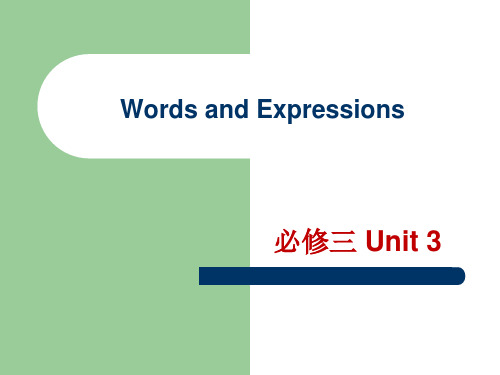
4.on the contrary 正相反, 恰恰相反 (只作状语)
(be)contrary to 违反, 与……相反 to the contrary 相反的(地)(作定语和状语) the contrary 相反;反面;对立面
It wasn’t a good thing; on the contrary it was a huge mistake.
+可数名词复数
a large/ great/ good number of
quite a little a great/ good deal of a large/ small amount of +不可数名词单数
大量, 许多
a large quantity of large quantities of plenty of a lot of lots of
spot sb./sth.doing sth.发现某人/某物正在做某事 be spotted with sth.被…….弄污
off the spot 不准确, 离题 on the spot 当场, 立即 put sb. on the spot 使某人尴尬, 使某人为难
6.spot
It’s easy to spot a tall man in a crowd.
(3) 走神 My attention/mind wandered. n. 漫游, 闲逛 go for /take a wander 去溜达
4.permit /vt.&vi./ 允许, 准许 /n./许可证, 执照
permit sb. to do sth. 允许某人做某事
permit sth./ doing sth. 允许某事/做某事 She won’t permit her dog to enter this yard. We don’t permit smoking in the office. permission/n./许可, 同意 ask sb. for permission =ask permission from sb. 请求某人许可 with/without (one’s) permission 得到/未经(某人的 )许可
新编英语教程unit3
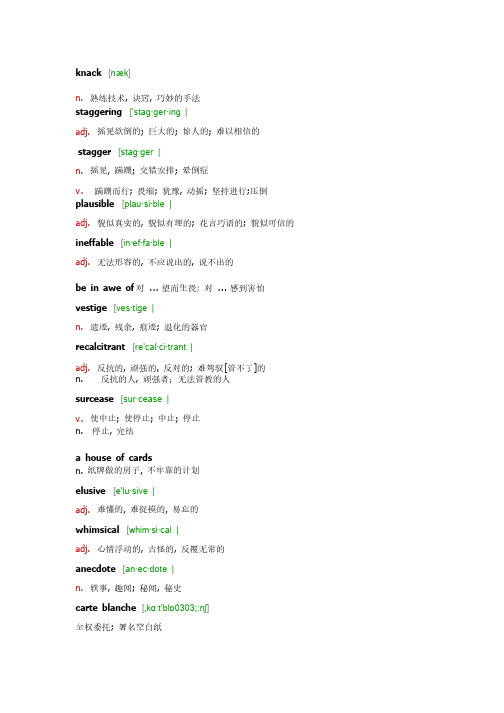
knack[næk]巧妙的手法n.熟练技术, 诀窍, 巧妙的手法staggering['stag·ger·ing |难以相信的adj.摇晃欲倒的; 巨大的; 惊人的; 难以相信的stagger[stag·ger |晕倒症n.摇晃, 蹒跚; 交错安排; 晕倒症压倒v. 蹒跚而行; 畏缩; 犹豫, 动摇; 坚持进行;压倒plausible[plau·si·ble |貌似可信的 adj.貌似真实的, 貌似有理的; 花言巧语的; 貌似可信的ineffable[in·ef·fa·ble |说不出的adj.无法形容的, 不应说出的, 说不出的感到害怕be in awe of对 ... 望而生畏; 对 ... 感到害怕vestige[ves·tige |退化的器官n.遗迹, 残余, 痕迹; 退化的器官recalcitrant[re'cal·ci·trant |adj.反抗的, 顽强的, 反对的; 难驾驭[管不了]的顽强者;无法管教的人n. 反抗的人, 顽强者;无法管教的人surcease[sur·cease |停止v.使中止; 使停止; 中止; 停止完结n. 停止, 完结a house of cards 不牢靠的计划n. 纸牌做的房子, 不牢靠的计划elusive[e'lu·sive |易忘的adj.难懂的, 难捉摸的, 易忘的whimsical[whim·si·cal |反覆无常的adj.心情浮动的, 古怪的, 反覆无常的anecdote[an·ec·dote |秘史n.轶事, 趣闻; 秘闻, 秘史carte blanche[‚kɑːt'blɒ0303;ːnʃ]署名空白纸全权委托; 署名空白纸plead with make an appeal to 向…恳求恳求awry [a ·wry |adv.歪斜地;扭曲地[的] look ~ adj. 脱离(路线)地[的]; (行动等)错误地[的],不顺遂地[的] go/run/tread~ prodigy [prod ·i ·gy |n.惊人的事物, 神童, 不凡的人不凡的人 infant/child podigy 神童神童不可思议之物; 壮观,奇观奇观The podigies of nature 自然奇观自然奇观自然奇观 dullard ['dull ·ard |n.愚人; 笨蛋笨蛋 stationary [sta ·tion ·ar ·y |adj.不动的; 定居的; 不增减的; 常备军的常备军的 n. 固定物(驻军) abreast [a ·breast |adv.并肩地; 并排地并排地 be [keep] abreast of [with] 与…并驾齐驱地并驾齐驱地 be ~ of [with] the times = keep ~ of the times 与时代并进,不落伍不落伍 patent [pat ·ent |n.专利权, 专利品, 执照执照 v.取得...的专利权, 请准专利请准专利 adj.专利的, 新奇的, 显著的,明显的; 明白的明白的 fabulous ['fab ·u ·lous |adj.传说的, 难以置信的, 惊人的; 非常的,无根据的;寓言般的; 想像中的想像中的 offshoot n. 分支, 支流,支道,旁系支流,支道,旁系collaborate [col ·lab ·o ·rate |v. (两个以上的人)合作(with (with……on/in ); 通敌,勾结勾结prey [pre ɪ]n.被掠食者, 牺牲者牺牲者 v.捕食, 折磨, 掠夺;使 ... 苦恼苦恼 quaint [kwe ɪnt ]adj.古雅的, 奇怪的, 离奇有趣的离奇有趣的 twirl [tw ɜrl ]旋转的东西n.旋转; 捻弄; 转动; 旋转的东西旋转v.快速转动, 捻弄; 转动, 旋转inward[in·ward || 'ɪnwə(r)d]内脏n.内部, 里面; 肠胃; 内脏向内的adj.内心的, 本来的, 向内的在内adv.向内; 在内furrow[fur·row |皱纹n.犁沟; 皱纹犁出浪迹v.犁; 弄绉; 耕; 犁田; 形成车辙; 开沟; 犁出浪迹placid[plac·id |沉著的adj.平静的, 平稳的, 沉著的fathom[fæðəm|推测n.深度单位; 推测看穿v.测量深度; 彻底了解; 看穿haggard| 'hægə(r)d]野鹰n. 野鹰形容枯槁的adj.憔悴的, 野性的, 形容枯槁的grief[grɪːf]grief-lined 伤心事n.悲痛; 不幸; 伤心事grope[grəʊp]的身体v.触摸; 探索, 探求; 暗中摸; 摸索; 抚摸...的身体暗中摸索的groping adj. 摸索的; 暗中摸索的steer[stɪr /stɪəɪə]阉牛n.指点, 建议#小公牛; 食用牛; 阉牛行进 v.掌舵, 驾驶; 带领; 指导; 操纵; 被驾驶, 驾驶起来; 行驶, 行进duet| djuː'et]二重奏n.二重唱; 二重奏reveal| rɪ'vɪːl]显示v.露出, 透露, 显示agitate[ag·i·tate || 'ædʒɪt e teɪt]煽动v.使激动; 搅动; 使焦虑; 摇动; 鼓动; 煽动wiggle| 'wɪgl]摆动n.踌躇, 摆动pier[pɪr /pɪə]桥墩n.码头, 防波堤, 桥墩generate| 'dʒenəreɪt]形成v.产生, 导致, 发生; 衍生; 形成tumble[tum·ble || 'tʌmbl] ~ down暴跌n.跌跤; 倒塌; 坠落; 暴跌使滚翻v.翻倒, 倒塌, 摔倒; 使摔倒, 弄乱, 使滚翻ineloquent inˋєləkwənt]无口才的adj.不善言辞的, 无口才的turmoil[tur·moil || 'tɜrmɔɪl /'tɜːɜː-]混乱 in a ~ n.骚动, 混乱revolutionary[,rev·o'lu·tion·ar·y || ‚revə'luːʃnərɪ]改革者n.革命者, 改革者革命性的 radical adj.革命的, 革命性的quantum[quan·tum || 'kwɑntəm /'kwɒ-]n.分配量, 量, 额serenity[se·ren·i·ty || sə'renətɪ]沉着n.晴朗, 风和日丽; 尊贵的阁下; 平静, 沉着殿下your Serenity 殿下confiscate[con·fis·cate || 'kɒnfɪskeɪt]充公v.没收; 查抄; 充公heed[hɪːd]留心n.注意, 留心注意 ~ sth/ give (pay) ~ to/take (no) ~ of v.留心, 注意agony['ag·o·ny || 'ægən a naɪz]爆发n.极度痛苦; 临死的痛苦; 苦恼; 爆发苦闷的in ~ 痛苦的,苦闷的他垂死的挣扎final ~ 他垂死的挣扎大喜的n an ~ of joy 狂喜的,大喜的战争的惨烈the ~ of war 战争的惨烈scarf[skɑrf /skɑːf]n.围巾; 头巾; 披巾; 领巾#嵌接; 槽; 斜面, 截面, 切口切口 akin [a ·kin || ə'k ɪn ] (to )adj.血族的, 同种的, 同族的同族的 cosmic [cos ·mic || 'k ɒzm ɪk(l)]adj.宇宙的, 有秩序的, 宇宙论的;广大无边的; 秩序井然的; 和谐的和谐的 ceaseless ['cease ·less || 's ɪːɪːsl ɪs ]adj.不停的, 不断的不断的 nerve [n ɜrv /n ɜːv ]n.神经; 忧虑, 焦躁; 神经过敏; 勇敢, 胆量胆量 v.鼓起勇气鼓起勇气 nerves 神经过敏神经过敏(的状态) ,神经质; 胆怯; 焦虑焦虑 神经过敏症,歇斯底里症歇斯底里症[又作又作a ~] 厚脸皮,无耻,冒失冒失 What (a) ~!.厚脸皮厚脸皮! delusion [de ·lu ·sion || d ɪ'lu ːʒn ]n.迷惑, 错觉, 欺瞒欺瞒 grandeur [gran ·deur || 'grændʒə(r)]n.庄严; 伟大;崇高,庄严庄严 conceit [con ·ceit || k ən'si ːt ]n.自负, 狂妄, 空想空想 roll into v. 滚进, 卷成, 使合为一体使合为一体=mix thoroughly; mingle together搅匀;拌和搅匀;拌和conversationalist [,con ·ver'sa ·tion ·al ·ist || ‚k ɑnv ə(r)'se ɪʃn əl ɪst /k ɒn-]n.健谈者, 交谈者, 爱交谈的人, 口才好的人口才好的人 maddeningly ['mædnɪŋl ɪ]adv.令人发狂地; 狂暴地; 狂怒地狂怒地 mania [ma ·ni ·a || 'me ɪnj ə] n.狂躁, 狂热, 热衷热衷 trivial ['triv ·i ·al || 'tr ɪv ɪəl ]adj.琐细的, 微不足道的, 价值不高的价值不高的 harangue [ha ·rangue || h ə'ræŋ]热烈的演说n.高谈阔论, 热烈的演说滔滔不绝地演讲v.滔滔不绝地演讲volubility[vol·u·bil·i·ty || ‚vɑljə'bɪlətɪ/‚vɒljʊ'b-]口若悬河 with ~ n.健谈; 口若悬河stun[stʌn]使惊吓v.使晕倒, 打晕, 使惊吓打昏n.晕眩, 惊倒, 打昏pamphlet[pam·phlet || 'pæmflɪt]小册子,宣传小册n.小册子,宣传小册applause[ap·plause || ə'plɔːz]鼓掌欢迎n.欢呼; 鼓掌欢迎eminent[em·i·nent || 'emɪnənt]杰出的adj.显赫的; 有名的; 杰出的vocalist['vo·cal·ist || 'vəʊəʊkəlɪst]歌手n.声乐家, 歌手rave[reɪv]热烈赞美n.胡言乱语; 呼啸, 咆哮; 狂骂; 热烈赞美v.胡言乱语; 激烈地说; 狂骂; 狂热赞扬, 极力夸奖; 赞扬的adj.赞扬的stamp[stæmp]n.邮票; 印花; 图章, 印v.贴邮票于; 盖章于; 压印于; 捣碎跺脚; 拒绝, 毁掉, 扑灭; 踩; 捣碎callous[cal·lous || 'kæləs]无情的adj.麻木的, 坚硬的, 无情的变得冷酷无情v.使硬结, 使麻木; 变硬, 结茧; 变得冷酷无情grovel[grov·el || 'grɑvl ,'grʌvl /'grɒvl]匍匐v.趴; 卑躬屈膝; 匍匐recipient[re·cip·i·ent || rɪ'sɪpɪənt]间接宾语n.接受者; 接受器, 容器; 受领者; 间接宾语unscrupulous/ʌnˈskruː.pjʊ.ləs/不谨慎的adj.无道德的, 狂妄的, 不谨慎的infidelity[in·fi·del·i·ty || ‚ɪnfɪ'delətɪ]无信仰,不忠诚n.不信神, 背信, 无信仰,不忠诚mortal[mor·tal || 'mɔrtl /'mɔːtl]人类n.凡人; 人类人类的adj.不免一死的, 临终的, 人类的burlesque[bur·lesque || bɜː'lesk]滑稽戏n.作戏, 滑稽戏取笑v.模仿; 取笑libretto[li·bret·to || lɪ'bretəʊ]歌词n.歌词集, 歌词testimony['tes·ti·mo·ny || 'testɪməʊnɪ/-mənɪ]证据n.证言, 声明, 证据作证bear ~ to 为…作证stupendous[stu·pen·dous || stuː'pendəs /-tju-]巨大的adj.惊人的, 巨大的span[spæn]跨绳n.墩距; 一段时间; 跨度; 指距, 一叉宽#跨绳套上 v.横跨, 跨越; 在...上建拱门; 在...架桥; 以指距量; 套上caricature[car·i·ca·ture || 'kærɪkə‚tjʊə]漫画n.讽刺画; 讽刺描述法; 漫画画成漫画讽刺v.画成漫画讽刺atonement[a'tone·ment || -mənt]赔偿 make ~ for n.补偿, 赎罪, 赔偿trilogy[tril·o·gy || 'trɪlədʒɪ]三部曲n.三部剧, 三部曲downright/ˈdaʊn.raɪt/率直的adj.明白的, 显明的, 率直的dumb[dʌm]不说话的adj.哑的, 无声音的, 不说话的be dumb with…. claw[klɔː]n.爪, 抓伤, 钩用爪子抓 v.用爪子抓; 费力地夺回; 用爪子抓shriek[ʃrɪːk]尖声n.尖叫, 尖声喊叫, 尖声尖声发出 v.尖叫, 发出尖锐的声音; 尖声发出。
(完整版)英语必修三unit3知识点总结
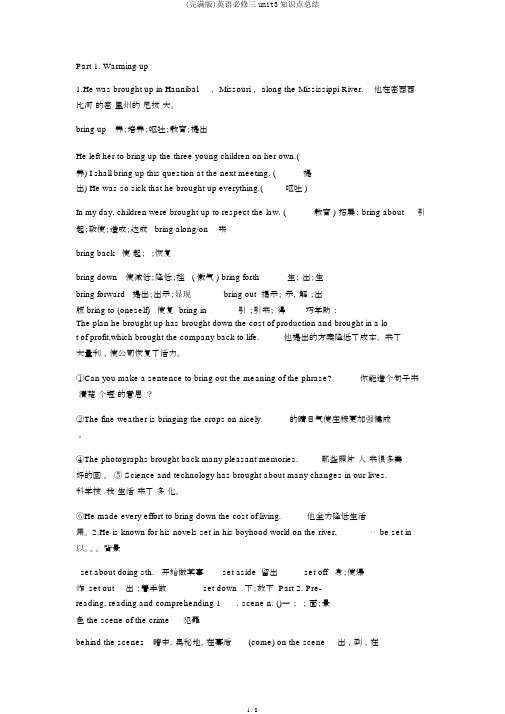
Part 1. Warming up1.He was brought up in Hannibal,Missouri,along the Mississippi River.他在密西西比河的密里州的尼拔大。
bring up养;培养;呕吐;教育;提出He left her to bring up the three young children on her own.(养) I shall bring up this question at the next meeting. (提出) He was so sick that he brought up everything.(呕吐 )In my day, children were brought up to respect the law. (教育 ) 拓展: bring about引起;致使;造成;达成 bring along/on 来bring back使起;;恢复bring down使减低;降低;挫 ( 傲气 ) bring forth生;出;生bring forward 提出;出示;显现bring out 揭示;示,解;出版 bring to (oneself) 使复 bring in引;引来;得巧学助:The plan he brought up has brought down the cost of production and brought in a lot of profit,which brought the company back to life.他提出的方案降低了成本,来了大量利,使公司恢复了活力。
①Can you make a sentence to bring out the meaning of the phrase?你能造个句子来清楚个短的意思?②The fine weather is bringing the crops on nicely.的晴日气使庄稼更加强健成。
Unit 3 知识点与练习
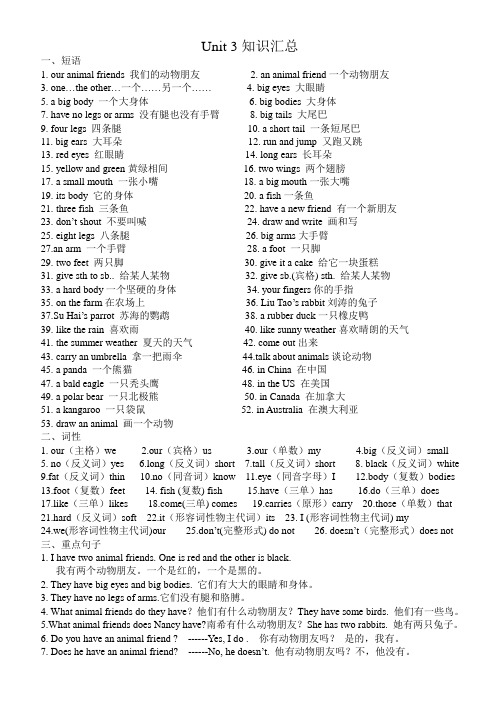
Unit 3知识汇总一、短语1. our animal friends 我们的动物朋友2. an animal friend一个动物朋友3. one…the other…一个……另一个……4. big eyes 大眼睛5. a big body 一个大身体6. big bodies 大身体7. have no legs or arms 没有腿也没有手臂8. big tails 大尾巴9. four legs 四条腿10. a short tail 一条短尾巴11. big ears 大耳朵12. run and jump 又跑又跳13. red eyes 红眼睛14. long ears 长耳朵15. yellow and green黄绿相间16. two wings 两个翅膀17. a small mouth 一张小嘴18. a big mouth一张大嘴19. its body 它的身体20. a fish一条鱼21. three fish 三条鱼22. have a new friend 有一个新朋友23. don’t shout 不要叫喊24.draw and write 画和写25. eight legs 八条腿26. big arms大手臂27.an arm 一个手臂28. a foot 一只脚29. two feet 两只脚30. give it a cake 给它一块蛋糕31. give sth to sb.. 给某人某物32. give sb.(宾格) sth. 给某人某物33. a hard body一个坚硬的身体34. your fingers你的手指35. on the farm在农场上36. Liu Tao’s rabbit刘涛的兔子37.Su Hai’s parrot 苏海的鹦鹉38. a rubber duck一只橡皮鸭39. like the rain 喜欢雨40. like sunny weather喜欢晴朗的天气41. the summer weather 夏天的天气42. come out出来43. carry an umbrella 拿一把雨伞44.talk about animals谈论动物45. a panda 一个熊猫46. in China 在中国47. a bald eagle 一只秃头鹰48. in the US 在美国49. a polar bear 一只北极熊50. in Canada 在加拿大51. a kangaroo 一只袋鼠52. in Australia 在澳大利亚53. draw an animal 画一个动物二、词性1. our(主格)we2.our(宾格)us3.our(单数)my4.big(反义词)small5. no(反义词)yes6.long(反义词)short7.tall(反义词)short8. black(反义词)white9.fat(反义词)thin 10.no(同音词)know 11.eye(同音字母)I 12.body(复数)bodies 13.foot(复数)feet 14. fish (复数) fish 15.have(三单)has 16.do(三单)does 17.like(三单)likes e(三单) comes 19.carries(原形)carry 20.those(单数)that 21.hard(反义词)soft 22.it(形容词性物主代词)its 23. I (形容词性物主代词) my24.we(形容词性物主代词)our 25.don’t(完整形式) do not 26. doesn’t(完整形式)does not三、重点句子1. I have two animal friends. One is red and the other is black.我有两个动物朋友。
- 1、下载文档前请自行甄别文档内容的完整性,平台不提供额外的编辑、内容补充、找答案等附加服务。
- 2、"仅部分预览"的文档,不可在线预览部分如存在完整性等问题,可反馈申请退款(可完整预览的文档不适用该条件!)。
- 3、如文档侵犯您的权益,请联系客服反馈,我们会尽快为您处理(人工客服工作时间:9:00-18:30)。
Unit 3 What do we eat today?大纲要求:一、词汇cabbage, steak, line, delicious, ready, order, dessert, starter, special, French, France, chocolate,butter, rarely, slim, seldom, instead, same, boring, various, piece, skip, winestand in line, take a look, look delicious, take orders, be ready to…, go to the gym, play sports,…percent of…, during meals, many different kinds of, at a time, because of, eating habits二、句型What would you like for breakfast/lunch…?Don’t eat the same thing every day. Eat variou s foods.It’s important to eat more fruit and vegetables, and drink a lot of water every day.三、语法可数名词与不可数名词的用法Unit3 Warm –up &Listening & Speaking课前预习单一、按要求将下列单词分类apple, banana, bread, cabbage, chicken, corn, dumpling, fish,grape, juice, milk, noodle, rice, steak, tomatofruit/vegetables: ______________________________meat: ______________________________drinks: ______________________________staple food: ____________________________二、词汇翻译dessert __________________ starter__________________special___________________ order ___________________stand in line_______________ take a look________________look delicious______________ tomato soup________________be ready to…______________ take orders________________三、句型初识(理解)1.What would you like for lunch?_____________________________________2.Are you ready to order?_____________________________________3.What’s the special today?______________________________________课堂探究单1.一个苹果/卷心菜__________________________________两个西红柿/两条鱼_________________________________一片面包_____________________________一杯牛奶/果汁_____________________________________一碗饭/面条/饺子___________________________________一把香蕉_______________________________一串葡萄_______________________________注意: 名词分可数名词与不可数名词。
可数名词前用a/an, 或数字来表示数量。
不可数名词前通常用"单位词+of"来表示数量。
如: a piece of paper, three pieces of paper不可数名词作主语时,谓语动词要用单数形式,但是不可数名词前有复数"单位词"时,谓语动词要用复数形式。
如:This cup of tea _____ for you.There_______ two cups of tea on the table. 桌上有两杯茶。
2.There are so many students here! 翻译:_____________________________类似的表达:如此多的钱___________________如此少的书___________________如此少的食物___________________so 的意思是:____________ 注意与such的用法区别用法归纳:1. so+形容词或副词;2. so +形容词+a/an+单数可数名词= such a/ an +形容词+单数可数名词;3. such+形容词+复数可数名词/不可数名词;如果名词前有many,much,few,little(少),等形容词,就必须用so,而不能用such高考链接Millie is _____clever a girl that she has worked out ____difficult math problems.A. so; soB. such; suchC. so; suchD. such; soI can't believe_____ little children can speak _____ many kinds of languages.A. so;soB. such;suchC. so;suchD. such;so3. The fish looks delicious. 翻译:__________________________look 用作_____动词,意思是______, 类似的动词还有:________________________除look之外,其它几个动词的主语往往是物。
后面接形容词。
翻译:这些花闻起来很香。
_________________________________这些西红柿摸起来很软。
___________________________4. Are you ready to order? 翻译:_____________________________be ready to do sth.be ready for sth.句型转换:The students are ready to take the exam= The students are ready ______ _______ _______Lei Feng is always ready to help others. 这句话中be ready to的意思是________________对口单招一点通:so和such的用法,尤其是当名词前有few, many, little, much 修饰时,必须用so是高考中经常考察的知识点,学生尤其要小心辨识little在句中解释为“小”还是“少”。
课堂检测单1. There is ____ bread on the table.A. aB. oneC. a piece ofD. many2 .There is some_______ on the plate.A. appleB. fishC. milksD. deer3. How many _________ would you like?A. paperB. breadC. pieces of breadD. pieces of papers4. -Have you got some water to drink?-Here you are. There___ still some in the bottle.A. areB. wereC. isD. was5. Mrs. White has___ that she is unable to get a job.A. so little educationB. such little educationC. so little an educationD. such a little education6. All of us feel surprised that ____ a little boy can eat ____ much food.A. such; soB. so; soC. such; suchD. so; such7. ---Did you see the football match last night?--- Yes, I have never seen ____ exciting match before.A. such aB. so aC. such anD. so an8. It is a pity that we should stay at home when we have ____ weather.A. so fineB. such fineC. such a fineD. so fine a9. That music ____ beautiful.A. is soundingB. soundsC. is soundedD. sound10. This kind of cake tastes _______.A. goodB. wellC. to be goodD. to be well课后巩固单一、根据句子需要选择so或such填空1. The boy is _____ young that he can’t go to school.2. He told us ______ a funny story that we all laughed.3. He has ______ few books to read that he has to borrow some books from the library.4. It is ______ a tall building that I can’t see its top.5. The girls had ______ high a fever that she nearly died last week.6. They are ______ clever children that all the teachers love them.7. It is ______ delicious orange juice that we all would love to drink it.8. It is ______ a little dog that Lucy likes it very much.9. There is ______ little water that it is not enough for ______ many people.10. It was ______ fine weather that they all went swimming.二、完成对话W—waitress M—Mike J—JanW: Welcome to Wendy’s House. ___________________________(你们准备点菜了吗)?M: I don’t know. ____________________________(你们今天的特色菜是什么)?W:Our steak is very nice.M: ______________(听起来不错). I’ll have the steak._______________________(你想吃什么,简)?J: I’d like the steak, too.W: __________________________(你们想要开胃菜吗)?M: A potato salad. J: Me, tooW: Anything to drink?M: No, thank you.Unit 3 Reading and WritingContents: Unit 3 Reading and WritingAims:1. Ss will be able to read out and tell the meaning of the following useful words and expressions: French, chocolate, butter, rarely, slim, France, seldom, instead, same, boring, various, piece, skip, wine, go to the gym, at a time.2. Ss will be able to discuss eating habits and health.Important Points:After reading the passage, let the Ss find out why French women aren’t worried about their weight.Difficult Points:Retell the text.Methods:Method of discussion, talking method and direct methodProcedures:课前自主预习单一、在课文中找到下列单词,写出词性和词意并熟读1. French( adj ) 法国的2. France( n ) 法国3. rarely ( adv ) 罕有,很少4. slim ( adj ) 苗条的5. seldom ( adv ) 不常,很少6. instead ( adv ) 反而,却7. various ( adj ) 各种各样的8. boring ( adj ) 令人厌倦的9. piece ( n ) 片,块10. skip ( v ) 不做,不参加二、词组翻译1. 变胖get fat2. 去健身房go to the gym3. 做运动play / do sports4. 百分之十的法国女人10 percent of women in France5. 在吃饭的过程中during meals6. 不同种类的食物various food7. 一次,每次at a time 8. 喝酒drink wine9. 由于because of10. 良好的饮食习惯good eating habits三、熟读下列句子并翻译1. They rarely go to the gym._____________________________________________2. Don’t eat the same thing every day. Eat various foods.______________________________________________3. It’s important to eat more fruit and vegetables, and drink a lot of water every day. _______________________________________________1. Free talkAre you worried about your weight? Do you want to control what you eat?2. Pre-readingLook at the picture on P43, and guess why French women aren’t worried about their weight..3. While-reading(1) Skimming. Read the passage quickly and finish Activity1(2). Scanning. Read the passage again and finish Activity2 & 3.(3) Careful reading. Read the passage carefully and then finish Task 4.4. Post-reading.(1) Read the passage after the tape and then read it loudly.(2) Retell the passage.(3) Explain some language points:1. rarely ( adv ) 罕有,很少seldom( adv ) 不常,很少这两个词都是表示否定意义的副词,类似的还有never, hardly, scarcely等。
